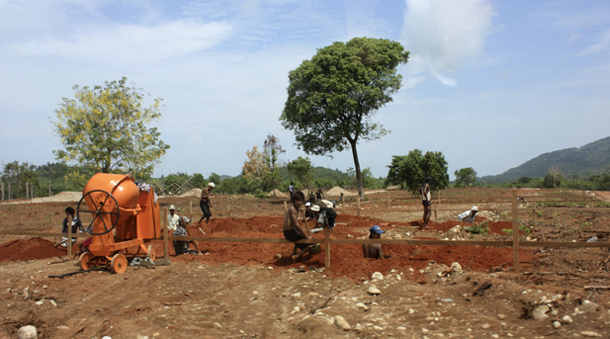RANGOON — Development projects that have rushed into southern Burma’s Dawei Township since ethnic Karen rebels signed a ceasefire early last year have severely damaged the livelihoods of local people, according to residents speaking in Rangoon on Tuesday.
About 10 people traveled from Tenasserim Division to Rangoon to speak with the media. They called on Burma’s government to rethink the rapid development of their homeland and to solve issues around the resettlement of people before allowing companies to begin operating.
Naw Kerisay, an ethnic Karen from Mitta village, said that people in the area had long been ignored while government forces fought the Karen. But now that there was relative peace following the January 2012 ceasefire agreement, she said, companies have quickly arrived and land grabs have been rife.
“We accept the ceasefire as it has brought peace. But we do not accept the investment after the ceasefire that has harmed our property,” she said.
The Dawei Development Association (DDA), the group organizing the press conference, highlighted the massive amount of economic activity now taking place around Dawei, which it says is not benefiting the local community.
A multibillion-dollar Thai-backed special economic zone and port development at Dawei is reportedly stalled, but a number of projects have recently started up.
Companies that have moved into the area include Thai mining firm East Star, Htoo Group, which is run by Burmese businessman Tay Za, and the military-run Union of Myanmar Economic Holdings Ltd, according to DDA.
In the waters off the Tenasserim coast, natural gas extraction projects are reaping huge rewards for the government and private companies. Among three offshore projects underway, the Yandanar field is generating 700 million cubic feet of gas per day and the Yetagun field is extracting 460 million cubic feet per day, DDA said.
Heinda Tin Mining, which has been awarded 8,000 acres of land, is also operating in Dawei. “This is an area where local people used to stay peacefully. But they have to move it out from the area now the mining project has come,” said Ye Lin Myint.
The population living around the Dawei River is generally split between the ethnic Dawei, who live on the west of the river, and Karen, who like to the east, in an area dotted with coal mining projects.
The gathered media in Rangoon were shown photographs of the alleged impacts of coal mining projects on the surrounding environment. Images showed a waterway in the mountainous area near Pa-Gar Yi village cloudy from pollution. Locals say they can no longer use the water after some people became sick and had skin problems from using it.
“There are huge problems in our area,” said Pho Ni is from Wa Khon village, in Dawei Township, who claimed fish had been dying near his home. “The main problem is mining in our area. We do not know whether they have official permission or not for mining here. But, we know they got instructions from the government to do it here.”
Pho Ni said that local people had little fait the government would solve their problems, and suggested that development could threaten a fragile ceasefire.
“If there is another revolution, we will be first people in Burma who come out to fight—against this investment,” he said.















